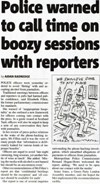 Dame Elizabeth Filkin’s warning that police officers should refrain from accepting alcohol from the media has had journalists reflecting on their own misdemeanours.
Dame Elizabeth Filkin’s warning that police officers should refrain from accepting alcohol from the media has had journalists reflecting on their own misdemeanours.
My one and only attempt to emulate the subterfuge and bravado of the renowned crime reporters of Fleet Street was hardly a stunning success. I ended up footing the bill for a boozy lunch for a clutch of Scotland Yard detectives but had little to show for the hospitality which the BBC had funded.
Hard drinking went with the territory in the macho world of crime reporting in the 1970s. Journalists, lawyers, senior officers and detectives mixed freely in the watering holes around both the Old Bailey and the Royal Courts of Justice in the Strand. It was an era when reporters had more free time – and also the expenses – with which to entertain their contacts; casual conversations over lunch or a drink could easily develop into a fruitful relationship.
Armed with the right personal or private telephone numbers a reporter could by-pass the press bureau at Scotland Yard and gain tip-offs and other useful information direct from the officers concerned – and for a high-flying detective a well-placed story provided useful publicity.
 Although my own direct experience is inevitably dated, there is no doubt that there has been continuing fraternisation – and perhaps collusion – between some journalists and senior officers and therefore this is a timely warning from Dame Elizabeth Filkin, the former commissioner for parliamentary standards.
Although my own direct experience is inevitably dated, there is no doubt that there has been continuing fraternisation – and perhaps collusion – between some journalists and senior officers and therefore this is a timely warning from Dame Elizabeth Filkin, the former commissioner for parliamentary standards.
In her report (4.1.2012) to the Metropolitan Police Commissioner Bernard Hogan-Howe she reminded police officers of the tricks which journalists employed to “loosen tongues”. She listed the kind of contact which should be avoided by the police: “late night carousing, long sessions, yet another bottle of wine at lunch – they are all long-standing media tactics to get you to spill the beans.”
My stint on the road as a general news reporter for BBC Radio 4 – after almost a decade at Westminster as a parliamentary reporter for The Times and the BBC – brought me into regular contact with the police when covering accidents, terrorist attacks, news worthy crimes and the like.
My political background meant I was perhaps an obvious candidate to report on the 1997 murder – by his butler – of Walter Scott-Elliott, a former Labour MP and government minister. The grisly tale surrounding the MP’s death and the four other murders committed by the butler, Archibald Hall (who died in 2002) gripped the nation. Bodies were eventually found up and down the country, the last two, of the MP and his wife, having been left in a stream and a shallow grave not far from Inverness.
Detectives on the case travelled far and wide and my task was to try to keep up with developments. I did finally make contact with the lead detective and arranged to meet him for lunch at the Cheshire Cheese, just off Fleet Street.
Obviously the word must have gone round the relevant office at Scotland Yard that some hospitality was on offer because my contact turned up with half a dozen of his colleagues who were all only too happy to partake of a free lunch and several bottles of wine.
My attempt to elicit the inside track on the investigation into the butler’s killing spree got nowhere; the detectives hardly acknowledged my presence. I ended up feeling particularly aggrieved on visiting the gents’ toilet and overhearing a conversation. One officer who had inquired who was picking up the tab for lunch, was told by a colleague: “Oh, some bloke from the BBC.”
The one positive outcome from the lunch was that I was at least on nodding acquaintance with my contact and some of his fellow detectives as I chased them around the country. I still remember the wet and windy Sunday afternoon when Mrs Scott-Elliott’s body was recovered from the stream near Inverness and I was able to report with great accuracy on the presence of Scotland Yard detectives.
My failure to elicit any worthwhile information about the case of an MP’s butler who became a serial killer was the result of my own failure to apply myself to the task in hand. Perhaps if I had spent serious time drinking with police officers and lunching contacts I might have been able to match the kind of informed stories which appeared under the by-lines of established crime reporters. But it was not to be.
Instead of socialising with police officers I began consorting with trade union leaders and the following year, in 1978 I became a labour and industrial correspondent and found to my cost that I had joined another group of reporters whose legendary heavy drinking was on a par with their colleagues on the crime beat.
Illustrations: Metro 5 January 2012; Daily Mail, 1 November, 2002
END
